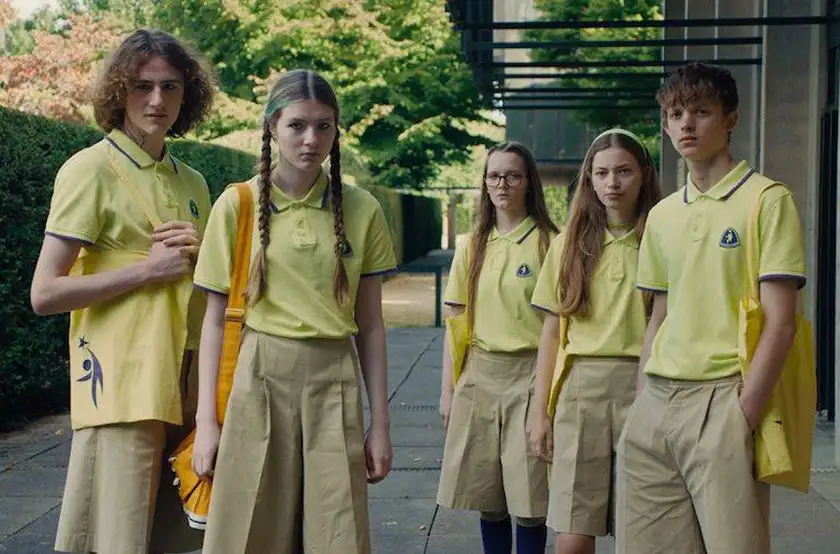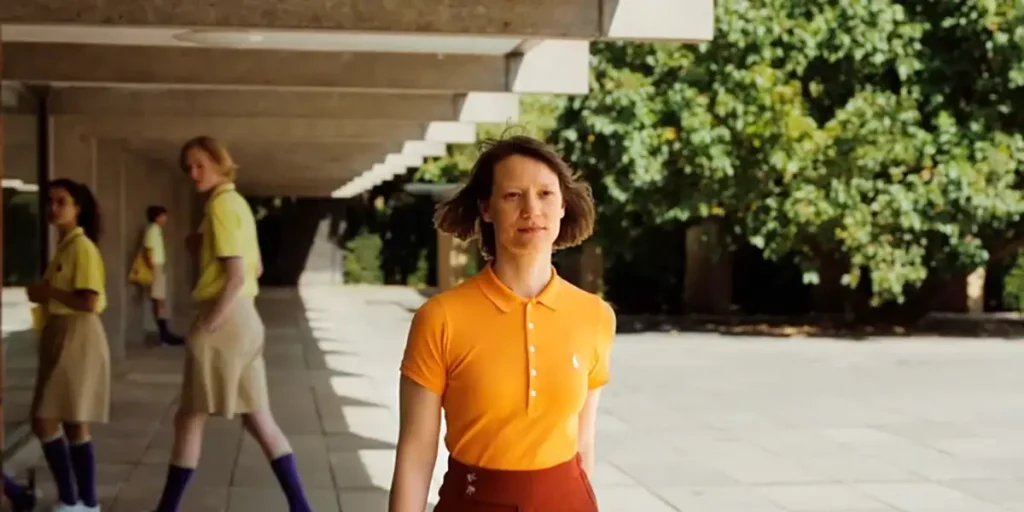Club Zero is a pitch-black satire that isn’t handled with the extreme conviction of the rest of Jessica Hausner’s filmography.
Jessica Hausner doesn’t make films that often. But when she does, they tend to leave a big impression. She has been inspired by other Austrian filmmakers, like the legendary Michael Haneke and the underrated Ulrich Seidl, who have found various ways of showing the ruinous impulses of polite society. But unlike the aforementioned, Hausner doesn’t tend to depend much on provocation. Instead, the Viennese director focuses on creating an experience filled with uncertainty through female-centered philosophical concepts. In her latest work, Club Zero, she slightly distances herself from that trajectory. Hausner decides to add a “shock factor” edge that serves as the catalyst for the film’s success or detriment, depending on your experience with it.
In Club Zero, Miss Novak (Mia Wasikowska), a newly hired teacher in a progressive British boarding school – the “crème de la crème” in the city – implements a strict regimen of dietary habits, which ultimately leads to catastrophe. Miss Novak is a double-faced woman: she’s empathetic when you are on her side, and cold when you aren’t. The school hires her to teach its students about “Conscious Eating,” and she explains to them that there are positive life-changing benefits that come with excessively reducing the amount of food they consume daily. These “improvements” are supposed to help not only their physical and spiritual selves but also the planet. In her meetings with the students, she talks about the health risks of processed foods, the benefits of a plant-based mono diet, and why the world is going under because of people’s dietary habits.
These young kids decide to follow Miss Novak’s theory, blinded to the truth by her venomous manipulation. Wasikowska impressively shows this exploit in captivating ways, elevating what may be Hausner’s weakest screenplay, in terms of bite and comedic precision. The Australian actress manages to capture that cult leader-like persona with ease. With a single non-expressionistic glance, she eats you alive. The way Wasikowska delivers her lines makes the people she talks to feel terrible about themselves for not following her practices. Miss Novak is a “pied piper” sort of figure: she persuades her small batch of younglings to follow her lead, exploiting them and leading to situations that will lead to huge complications in the long run.
Club Zero is a satire about consumerism, the environmental crisis we are experiencing, and the obsession with “thinspiration” dietary habits through a cult-like grouping. One of the things that Hauser does brilliantly is depicting the development of this persona and how that person manages to consume their followers’ minds. When the students are indeed going along with this charade, she is the most charismatic person ever, the camera slowly zooming in as she speaks her fallacies into these teens’ ears. The closer cinematographer Martin Gschlacht’s camera is, the more the students sink into her practices. There aren’t many swift camera movements that leave the viewer wholly impressed by the cinematography. However, these minor motions add up to tell a good story visually.

This “Conscious Eating” idea sounds like total nonsense to the audience. But the students actually manage to believe Miss Novak and cut their meals, some of them entirely. Hauser plays with hazardous material here, where one misstep in the narrative could make her film feel very insensitive to the issues being tackled. These ideas have been covered before, yet none of them in this manner, where cold-blooded irony leads the way. However, she handles the subject matter carefully within the satire – maybe way too carefully, if you ask me. In the first couple of days of this diet, the students take deep, long breaths before each bite, questioning whether they should or shouldn’t do what their teacher tells them to. But sooner rather than later, their portions grow smaller and smaller, to the point where their plates look utterly empty.
On one occasion, you only see them eat three potato slices with a cup of water. You slowly witness how these dietary changes begin to change their minds and bodies, making them grow weaker and land in the palm of Miss Novak’s hand. Because Jessica Hausner occasionally keeps it safe, as she doesn’t want her film to feel exploitative, Club Zero doesn’t dwell on body horror when showing these changes. Hauser and her crew could have elevated things to another level, but the film would have become a completely different project, losing its uniqueness. Jessica Hausner’s latest is odd yet intriguing, feeling like a work crafted by the mind of Yorgos Lanthimos due to its dry, deadpan comedic sensibilities and self-assured direction.
From the odd, straight-faced lines in the screenplay to the muted presentation of Club Zero’s production design, Hausner makes many decisions that shouldn’t work, especially for those who don’t know about her work and process. In her hands, they tend to do so. She is so accustomed to distancing the viewer that it paves the way for an intriguing picture that lives in a world of its own.
Each film in her filmography has its own identity, and Club Zero is no exception. But while her filmography can be described as high-risk and distinctive, it doesn’t seem like she is getting the most out of her premise here. The reason is that Hausner tends to hold back when she starts digging her teeth into the material.
There are many fascinating ideas and critiques in Club Zero, most of them relating to the relationship between neglectful parents and their vulnerable children. However, these notions are mostly superficial; Hausner only manages to peel a single layer in this stratified piece, without expanding on the psycho-sociological aspects of her ideas. The film lacks the clarity and poignancy seen in her previous work. Instead of developing corrosive set pieces that match Club Zero’s pitch-black comedy, she creates scenes that slowly exhaust the viewer and weaken the film. Mia Wasikowska and the rest of the cast help elevate the weak material with their performances, but they can only do so much; the rest is in the director’s hands.
Most of the shocking scenes in this film don’t discomfort the viewer, but honestly, this one is in a league of its own. If you felt sick during the yacht sequence in Ruben Östlund’s Triangle of Sadness, Club Zero will make you feel even worse. (At the very least, the film has a trigger warning before it begins.) I don’t honestly get bothered with scenes involving bodily fluids or something of the sort. With this one, I had to look back, avoiding the scene altogether, and even then, the sounds made me sick. I felt this was a desperate move from a filmmaker who has always been assured during her entire career – losing her confidence to cause cheap provocation.
Club Zero will be released in US theaters on March 15, 2024.

